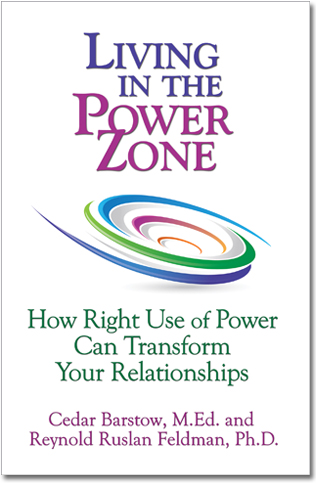
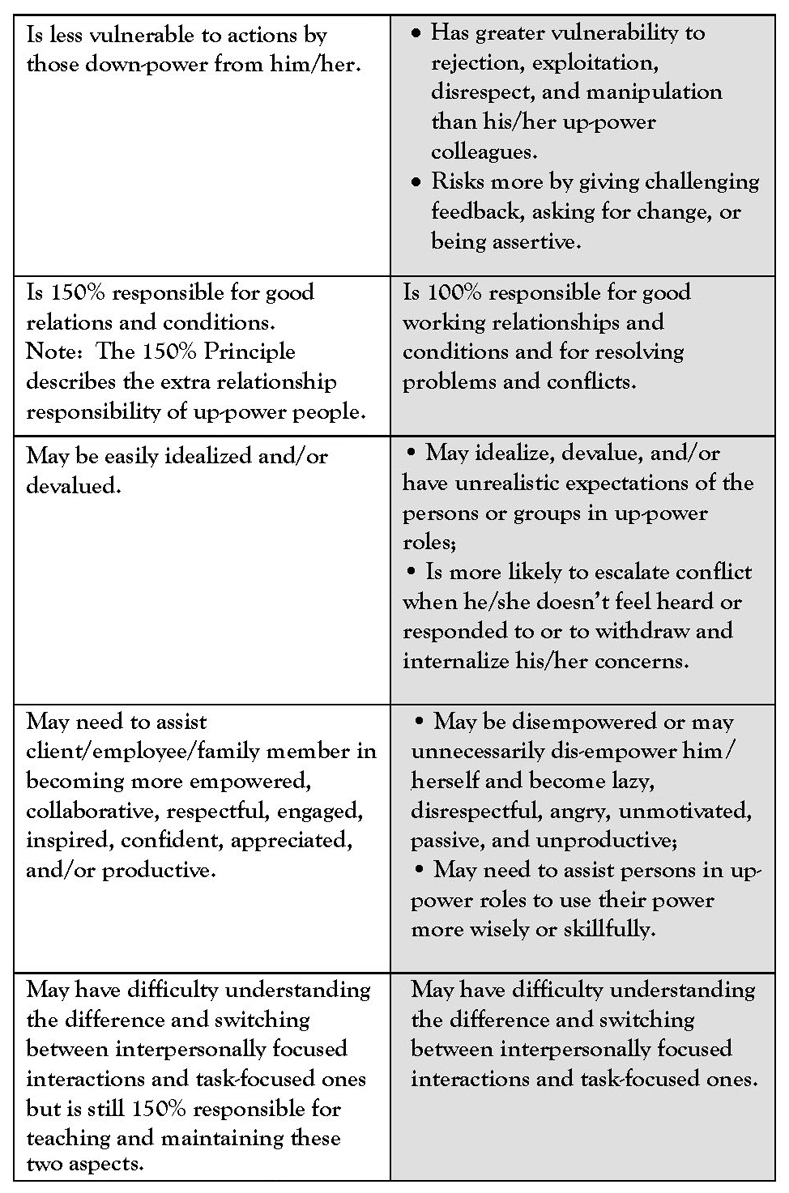
Living in the Power Zone
How Right Use of Power Can Transform YourRelationships
Cedar Barstow, M.Ed., C.H.T.
Reynold Ruslan Feldman, Ph.D.
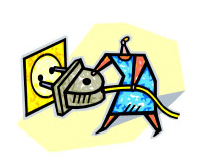
Copyright  2014 Cedar Barstow and Reynold Feldman
2014 Cedar Barstow and Reynold Feldman
All rights reserved. No part of this book may be usedor reproduced in any manner whatsoever without written permissionfrom the publisher, except in the case of brief quotations embodiedin critical articles and reviews.
Please contact the publisher for bulk orders ofLiving in the Power Zone.
First Edition, March 2013
E-book and Second Edition, April 2014
Smashwords Edition
Licensing Notes
This e-book is licensed for your personal use andenjoyment only. This e-book may not be re-sold or given away toother people. If you would like to share this book with anotherperson, please purchase an additional copy for each recipient. Ifyou are reading this book and did not purchase it, or if it was notpurchased for your use only, please visit Smashwords.com andpurchase a copy for yourself. Thank you for respecting thisauthors work.
Many Realms Publishing
Boulder, CO
www.rightuseofpower.org
ISBN 978-0-9743746-0-4
E-Book by e-book-design.com .

We dedicate this book to our parents
Robbins, Meg, Jack, and Estelle
who empowered us through their love and sacrifices toboth read books and write them, including this one.
With love and gratitude,
Cedar and Ren
When you eat a fruit, remember the people who plantedthe tree.
(Vietnamese Proverb)
Acknowledgments
If it takes a whole village to raise a child,the same is true for producing a book. Ideas are like Lego pieces.They pre-exist any given construction and are simply reassembled byauthors into something new. We therefore thank all those thinkersand doers, present and past, both friends and individuals known tous only through their writings, who have unwittingly collaboratedin the creation of Living in the Power Zone. Saying they aretoo many to name isnt just a clich; its also a truth. So to allthose individuals who have informed the thinking and writing ofthis book, we offer a sincere thank-you.
To those closer to home who have supported us innumerous ways, including through their unconditional love, we offerthanks as well: Our siblings and their spouses, as well as ourchildren, step-children, grandchildren, godchildren, and honorarychildren. We also acknowledge our housemates, Doug McLean andMargaret Pevec, eye-witnesses to our periodic enthusiasms andfunks, who always encouraged us and gave us that occasional knowingsmile. You guys are the best!
Thanks to the members of Cedars Womens PeaceCircleSarah Hartzel, Judith Blackburn, Jean Lovell, ShelleyTanenbaum, and the late Linda Clark; Cedars dear friends AminaKnowlan (who first came up with the concept of ethics as equivalentto the right use of power); Terry Keepers for his contributions tothe section on shame; Charna Rosenholtz, and Anna Cox; colleaguesin the Hakomi Institute; Rens North Boulder-Sumac Mens Group; ourbeloved friends in Rungan Sari, Kalimantan, Indonesia, who helpedus develop many new exercises and ideas for right use of power foreveryone; our ministers and growing circle of friends at St. JohnsEpiscopal ChurchBoulder; the participants in BouldersSpiritkeepers Interfaith Fellowship; and our brothers and sistersof Subud-Boulder, all of whom would ask about our work and besupportive.
Special thanks to our Advisory TeamRichIreland, Shelley Tanenbaum, Jenny Morawska, and Eva Fajardo; theBoard of Directors of the new nonprofit Right Use of PowerInstitute (RUPI), Boulderthe Rev. Dr. Marni Harmony, Chairas wellas the members of the Guild of Facilitators, Amanda Mahan, Manager.Its important to mention at this point that Marni was theindividual who gave Cedar the idea for the 150% Principle,discussed later in this book. We are also grateful to the variousRight Use of Power trainees whose words and impressions we havecited at various places in the text. They help justify the sayingthat teachers frequently learn more from their students than theirstudents learn from them.
Special thanks to our graphic-design consultant,Marilyn Hager Adleman, for her elegant work as well as our contactsat Lightning Source Printers and My Word Publishing.
In conclusion, we would like to thank the God ofour understanding, the Great Life Force, that has enabled us to behere, learn from our experiences, and assemble in this bookconcepts and tools which we hope will prove useful to you, ourreaders. Please forgive us for any mistakes or shortcomings, orbetter, send us your suggestions for improvement to .One of the benefits of e-books and print-on-demand books is thatwriters can easily revise and improve their works from time totime, and it is our intention to use your corrections andsuggestions to do just that. So thanks in advance for yourinput.
Sincerely,
CD & RRF
Boulder, Colorado April 2014
Table ofContents
: Owning Your Power and Influence
: Negotiating Power Differences
: Increasing Your Awareness andSensitivity
: Living in the Power Zone
: Strengthening Your Core
: Resolving and RepairingInterpersonal Difficulties
: Overcoming Barriers to Power
: Leading Wisely and Well
: Try This!

Preface
Once upon a time there were two leaders,a kindly one and a mean one. The mean one was privately tutored bya scholar who loved the Renaissance ideas of Niccol Machiavelli.According to this tutor, there were three things every sensibleleader should dogain power, increase power, and maintain thepersonal benefits achieved by power. The kindly leader, meantime,was privately tutored by a scholar who loved the ideas ofDesiderius Erasmus, a Dutch contemporary of the ItalianMachiavelli. According to this tutor, there was only one thingevery sensible leader should douse power for the benefit andwell-being of his or her followers.
In the democratizing world of the 21st Century,it is no longer enough to have ethical leaders concerned with thecommon good. There are too few of them in any case. As important,possibly more so, is that we everyday citizens learn to usewhatever power we haveand we all have somein ways thatincreasingly benefit ourselves, others, and the world beyond.Numbers matter. So the more of us who learn to use our power well,the better the chances that our great-grandchildren and theirs willinherit a livable world where love trumps hate and peace has begunto vanquish war.
Next page
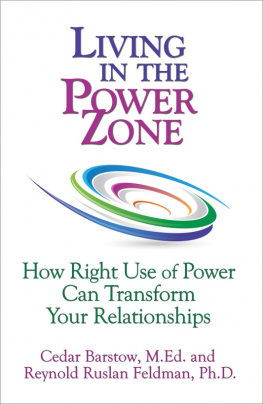

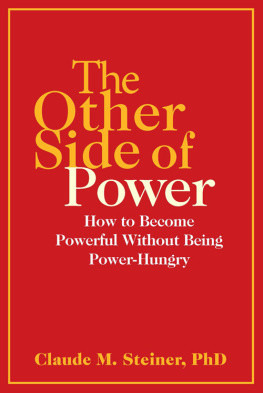
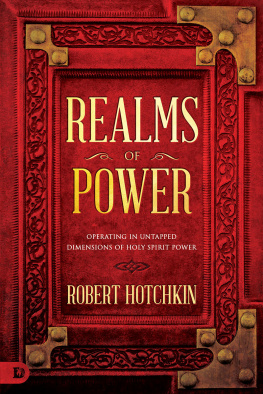
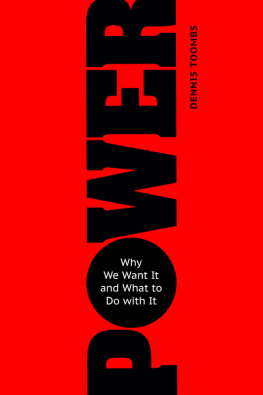

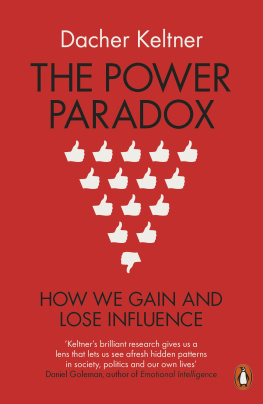

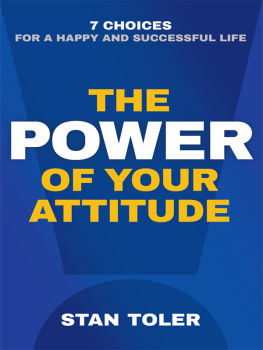
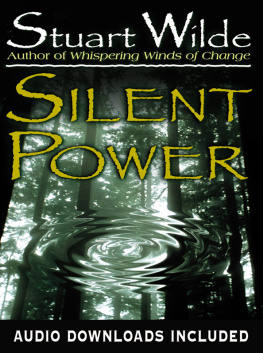





 2014 Cedar Barstow and Reynold Feldman
2014 Cedar Barstow and Reynold Feldman